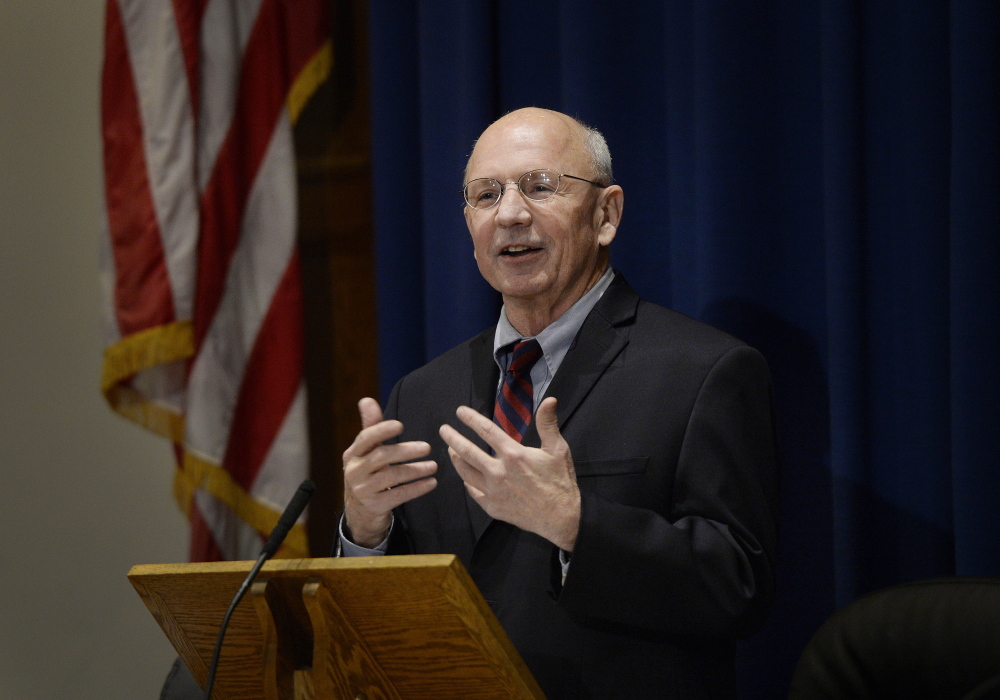Mayor Michael Brennan on Wednesday touched on a wide range of issues in the last State of the City address in this term as mayor, including initiatives to bring fiber-optic broadband to Portland, provide year-round schooling to at-risk children and create a hub for health information.
Brennan also would like to focus development efforts from the city’s urban peninsula to Forest Avenue, saying that will allow the city to preserve historic buildings while realizing housing and economic opportunities.
“I believe the future of the city and the future of development is tied to the future of Forest Avenue,” he said. “There are great economic and residential opportunities between downtown Portland and all the way out to Morrill’s Corner.”
Brennan, who is in the last year of a four-year term as Portland’s first popularly elected mayor in 90 years, only briefly mentioned Gov. Paul LePage’s budget proposal during his 45-minute address. The budget, which seeks to eliminate the state income tax and reduce revenue to municipalities, could cost Portland millions of dollars, while giving it the power to tax large nonprofits.
“All I can tell you is that the governor’s budget now creates a great deal of uncertainty,” Brennan said.
Brennan said next month he and the city’s economic development director, Greg Mitchell, will convene a working group to study ways to bring fiber-optic broadband to the city, something other communities, like South Portland, already have done. Brennan said a broadband project in Portland would be challenging financially and logistically because the city is so developed, yet it is as important as building housing, roadways and bridges.
“Again, it will be a challenge, but I’m sure we will find a way that will allow us to go forward,” he said.
Brennan said the city has received a $50,000 grant from the Maine Technology Institute to study ways to create a “health informatics cluster” in the region. The study is expected to be released this spring to recommend ways to establish a group of businesses that provide data and technology to hospital and health-care providers across the country.
“We need good-paying jobs, not just service jobs,” Brennan said.
In last year’s State of the City address, Brennan called for establishing a citywide minimum wage, a proposal now being considered by a council committee.
Brennan also noted the waterfront, which he said is “critical to the future of Portland.”
He celebrated the New England Ocean House Project being led by the Icelandic shipping company Eimskip, as well as a project that would bring rail service to the International Marine Terminal.
He also highlighted his initiative to increase the amount of local food used in schools. Next year, the city is expected to reach its goal of having half of the food eaten by students to be locally sourced.
Brennan also wants to increase the amount of local fish used by institutions. The groundfishing industry has struggled in recent years. He said finding institutions to buy abundant local fish – red fish, dog fish and pollack – could help.
Brennan said Growing Portland, a wide-ranging initiative to increase economic opportunity and improve the city’s workforce, recently received an $80,000 grant to develop a “workforce pipeline” for people having difficulty getting jobs. He also called for increasing efforts to recruit young professionals to move to the city.
Portland also has received a $50,000 grant from the National League of Cities to expand the city’s summer feeding program and potentially offer summer school to students, especially low-income and students of color.
Through his Portland ConnectED program, Brennan helped expand summer feeding and reading programs for students who often go without food and lose educational gains over the summer.
He described the potential summer education program as “a 21st-century program for experiential learning opportunity” using parks, museums, and summer and recreational programs. It could utilize the city’s cultural, arts and recreational programs, rather than classrooms.
“I think all the students in the city of Portland are going to be very excited and we’re going to be able to engage them in ways they will be more willing to participate,” Brennan said.
He reiterated the city’s commitment to ending homelessness and changing zoning laws to allow for more housing to be developed.
Noting the importance of having a transparency in government, he cited the city’s new website and its new “Fix It! Portland,” which allows residents to report problems and track the city’s response.
“It’s a significant step forward in terms of transparency,” he said.
He also said the city is contemplating creating a housing database so tenants can see if their housing is safe, and improving the city’s housing inspection program. The database could be part of a set of recommendations from a task force formed after the fire on Noyes Street in November that killed six young people.
He also said city officials will roll out a new budget process to increase engagement.
“(We) are incredibly sensitive to property tax issues,” he said. “We want residents to understand that … we’re paying attention.”
Send questions/comments to the editors.




Success. Please wait for the page to reload. If the page does not reload within 5 seconds, please refresh the page.
Enter your email and password to access comments.
Hi, to comment on stories you must . This profile is in addition to your subscription and website login.
Already have a commenting profile? .
Invalid username/password.
Please check your email to confirm and complete your registration.
Only subscribers are eligible to post comments. Please subscribe or login first for digital access. Here’s why.
Use the form below to reset your password. When you've submitted your account email, we will send an email with a reset code.